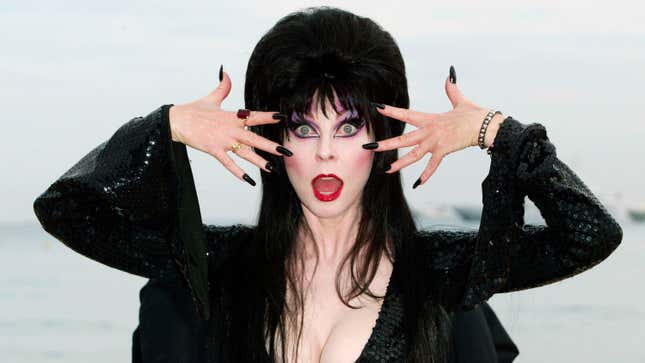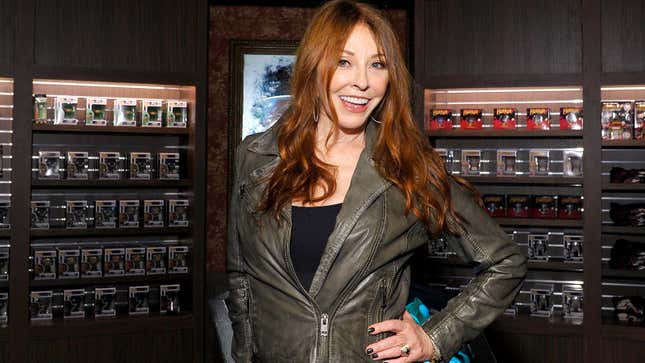Cassandra Peterson on Coming Up with Elvira, Coming Clean in Her Book, and Coming Out
Yours Cruelly, Elvira: Memoirs of the Mistress of the Dark is a doozy of a tell-all, in which Peterson bares more than ever before
BooksEntertainment
Photo: Evan Agostini
Elvira is letting it all hang out…more. The big news coinciding with this week’s release of Cassandra Peterson’s memoir, Yours Cruelly, Elvira Memoirs of the Mistress of the Dark, is that she has been in a relationship with a woman (referred to in the book only as “T”) for the past 19 years. It’s incredible that she was able to keep it hidden for so long. “I’m a good secret-keeper,” Peterson told Jezebel in a conversation last week regarding her book and career.
She may be good at keeping secrets, but Yours Cruelly feels as full of a disclosure as you’re likely to encounter in a celebrity memoir. Peterson told me she’s an avid reader of the genre, and has encountered so many books that fail to deliver on their promises. In response, Yours Cruelly never stops delivering. It dishes on sex with famous men (Tom Jones, Robert De Niro, and Jon Voigt among them), chronicles her development in the entertainment industry which began when she was a 17-year-old Las Vegas showgirl, and delves into her childhood scars, both literal (via a pot of boiling water that fell on her at 18 months of age) and figurative (through a fraught relationship with her mother). Peterson describes the sexual harassment she’s experienced in her industry, and she writes about being raped, including by legendary basketball player Wilt Chamberlain, whom she considered a friend until, she writes, he forced oral sex on her.
Yours Cruelly also details the creation of Peterson’s pièce de résistance, her Elvira character. A collaboration with stylist Robert Redding and writer/performer John Paragon (who died earlier this year and is probably best known for playing the role of Jambi on Pee-Wee’s Playhouse, a show he also wrote for), Elvira started as a horror movie host on Los Angeles station KHJ in 1981’s Elvira’s Movie Macabre and went on to become a national sensation. Elvira’s loving mockery of the trashy flicks she presented provided a foundation for the snarky sensibility commonplace on the internet by the 2000s.
Peterson talked to Jezebel about her book and work last week on the eve of her 70th birthday. “This is my last interview being 69,” she said. Nice! An edited and condensed transcript of our conversation follows.
JEZEBEL: How long have you been considering writing a memoir?
CASSANDRA PETERSON: I have been thinking about it forever. [My life] was pretty bizarre before I was Elvira. I almost feel like when I became Elvira, that’s when my life calmed down and got normal. I started about 15 years ago, writing little essays and making notes and collecting pictures and doing that kind of stuff. And then the pandemic came along and gave me the time to really concentrate on doing it without having to run here and travel there.
Did you work with a co-writer?
No, I did it all myself. I went to a coffee shop near my house and sat in there four to eight hours a day, every day, even weekends. And I just wrote and wrote and wrote by myself. I went to different writing classes during that process and some editing classes. It was funny, the editing class I went to was called Frankenstein’s Lab, which is perfect.
-

-

-

-

-

-

-

-

-

-

-

-

-

-

-

-

-

-

-

-

-

-

-

-

-

-

-

-

-

-

-

-

-

-

-

-

-

-

-

-









































